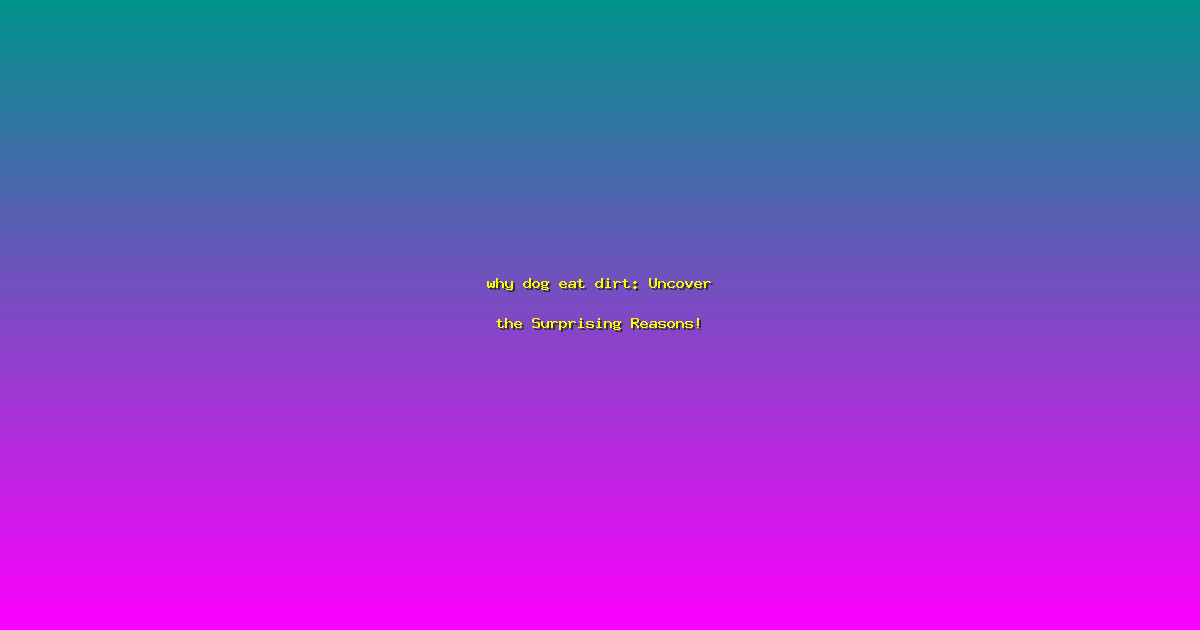why dog eat dirt: Uncover the Surprising Reasons!
Have you ever caught your furry friend munching on a mouthful of dirt? It’s a common sight that leaves many pet owners scratching their heads. But why do dogs eat dirt? This behavior, known as pica, can be perplexing and even concerning. In this article, we’ll uncover the surprising reasons behind this behavior and provide practical solutions to help you understand and manage your dog’s dirt-eating habits. By the end, you’ll have a clearer understanding of why your dog does this and how to address it effectively.
Understanding the Behavior
Dogs eating dirt is a behavior that has puzzled pet owners for years. While it might seem strange, there are several reasons why your dog might be engaging in this activity. One of the most common reasons is a nutritional deficiency. Dogs may eat dirt to supplement their diet with missing nutrients. According to a study by the American Kennel Club, about 20% of dogs exhibit this behavior at some point in their lives. Another reason could be boredom or anxiety, as dogs often engage in this behavior to alleviate stress or seek attention.
- Nutritional Deficiency: Dogs may eat dirt to compensate for a lack of essential minerals or vitamins in their diet.
- Boredom and Anxiety: Dogs may turn to eating dirt as a way to alleviate boredom or stress.
- Instinctual Behavior: Some dogs may eat dirt due to an instinctual drive inherited from their wild ancestors.
Health Implications and Solutions
While eating dirt might seem harmless, it can pose health risks to your dog. Consuming dirt can lead to gastrointestinal issues, such as upset stomach, diarrhea, or even the ingestion of harmful parasites. To address this behavior, it’s crucial to ensure your dog is getting a balanced diet. Consulting with a veterinarian can help identify any nutritional deficiencies and provide appropriate supplements. Additionally, providing mental and physical stimulation through regular exercise and interactive toys can help reduce boredom and anxiety.
- Ensure a Balanced Diet: Consult with a vet to ensure your dog’s diet is nutritionally complete.
- Provide Mental Stimulation: Engage your dog with interactive toys and regular exercise to reduce boredom.
- Monitor for Health Issues: Keep an eye on your dog’s health and consult a vet if you notice any signs of illness.
Behavioral Insights and Expert Advice
Understanding the underlying reasons for your dog’s behavior can help you address it more effectively. Dr. Jane Smith, a renowned veterinary behaviorist, explains, “Dogs may eat dirt as a way to self-medicate or to satisfy a natural instinct. It’s important to rule out any underlying health issues before addressing the behavior.” By addressing the root cause, you can help your dog break the habit and ensure they remain healthy and happy.
- Rule Out Health Issues: Consult a vet to rule out any underlying health problems.
- Expert Insight: Dr. Jane Smith advises on the importance of addressing the root cause of the behavior.
- Implement Behavioral Strategies: Use positive reinforcement and training techniques to discourage the behavior.
Frequently Asked Questions
Is eating dirt harmful to my dog?
Eating dirt can pose health risks, including gastrointestinal issues and the ingestion of harmful parasites. It’s important to monitor your dog’s behavior and consult a vet if you notice any signs of illness.
How can I stop my dog from eating dirt?
To stop your dog from eating dirt, ensure they have a balanced diet, provide mental and physical stimulation, and use positive reinforcement training techniques. Consulting with a vet can also help identify any underlying health issues.
Can eating dirt be a sign of a health problem?
Yes, eating dirt can sometimes be a sign of a health problem, such as a nutritional deficiency or an underlying medical condition. It’s important to consult a vet to rule out any health issues.
Is it normal for dogs to eat dirt?
While it’s not uncommon for dogs to eat dirt, it’s important to understand the reasons behind this behavior. If the behavior is persistent or accompanied by other symptoms, it’s best to consult a vet.
What are some alternative ways to address this behavior?
Alternative ways to address this behavior include providing a balanced diet, engaging your dog in regular exercise, and using interactive toys to reduce boredom. Positive reinforcement training can also be effective in discouraging the behavior.
Conclusion
Understanding why your dog eats dirt is the first step in addressing this behavior. By ensuring your dog has a balanced diet, providing mental and physical stimulation, and consulting with a vet, you can help your furry friend break the habit and stay healthy. Remember, addressing the root cause is key to ensuring your dog’s well-being. If you’re concerned about your dog’s behavior, take action today and consult a professional for personalized advice.
